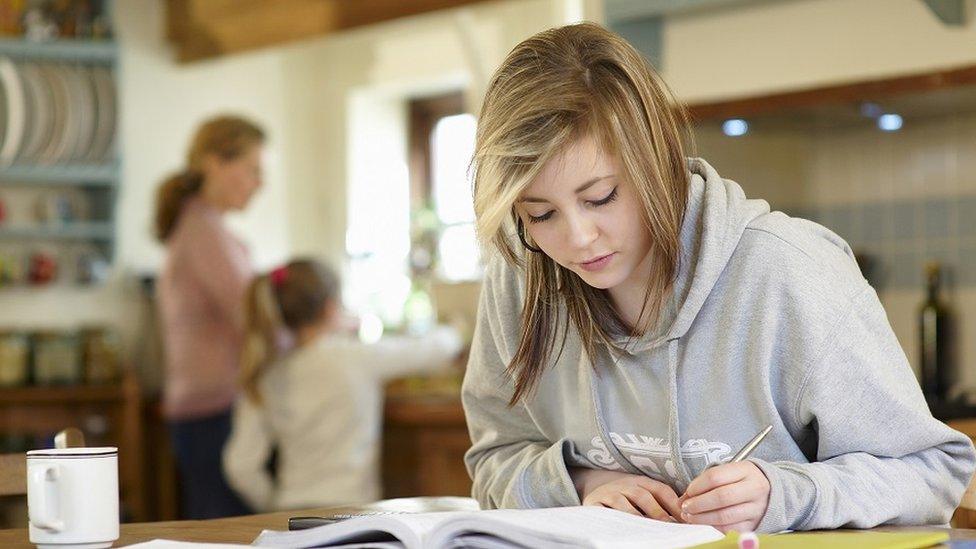Five takeaways from this year's GCSE results
- Published

Students who picked up their GCSE results on Thursday were part way through Year 8 when the pandemic hit and schools closed during national lockdowns.
Further school closures followed, while they were in Year 9, and many experienced disruption due to Covid at the beginning of Year 10 as well.
They sat their first formal exams this year, which England's exam watchdog, Ofqual, said would be about "getting back to normal". But the impact of Covid, and the disruption to children's education, is clear in this year's results.
Here are five key takeaways.
1. GCSE grades have fallen again
GCSE passes in England, Wales and Northern Ireland have fallen for a second year running - with 68.2% of all grades 4/C and above.
It will mean disappointment for some students but has nothing to do with their individual performances.
It is all part of a plan to bring grades back down in line with pre-pandemic levels.
The pass rate was:
67.3% in 2019 - the last year exams were sat before Covid
73.2% in 2022 and 77.1% in 2021, when exams were cancelled and results based on teachers' assessments.
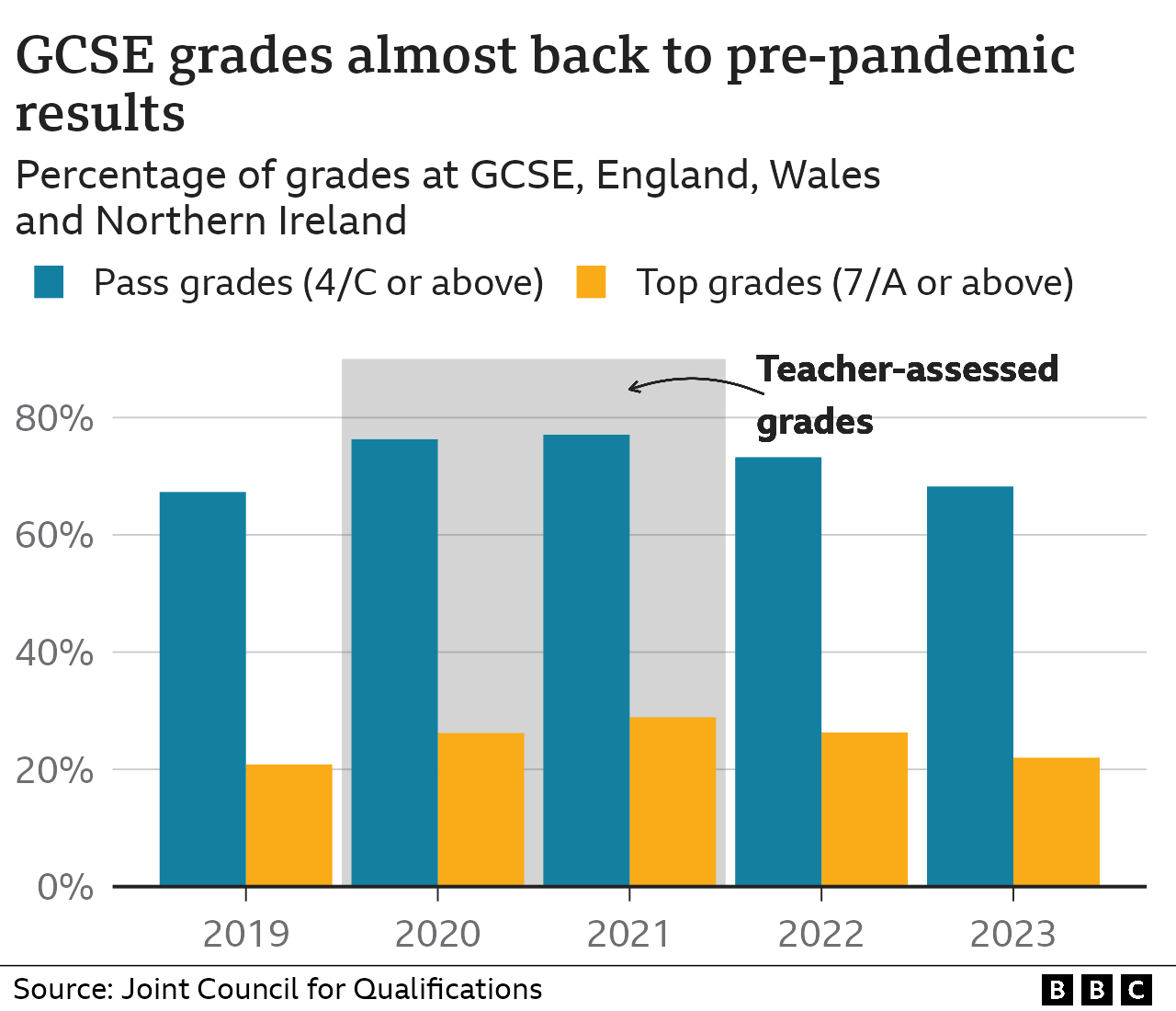
2. The drop is steepest in England
It was always the plan for grades to be brought back in line with 2019 levels this year in England but remain a bit higher in Wales and Northern Ireland.
The pass rate was:
67.8% in England, down from 73% in 2022
64.5% in Wales, down from 68.2%
86.6% in Northern Ireland, down from 89.8%
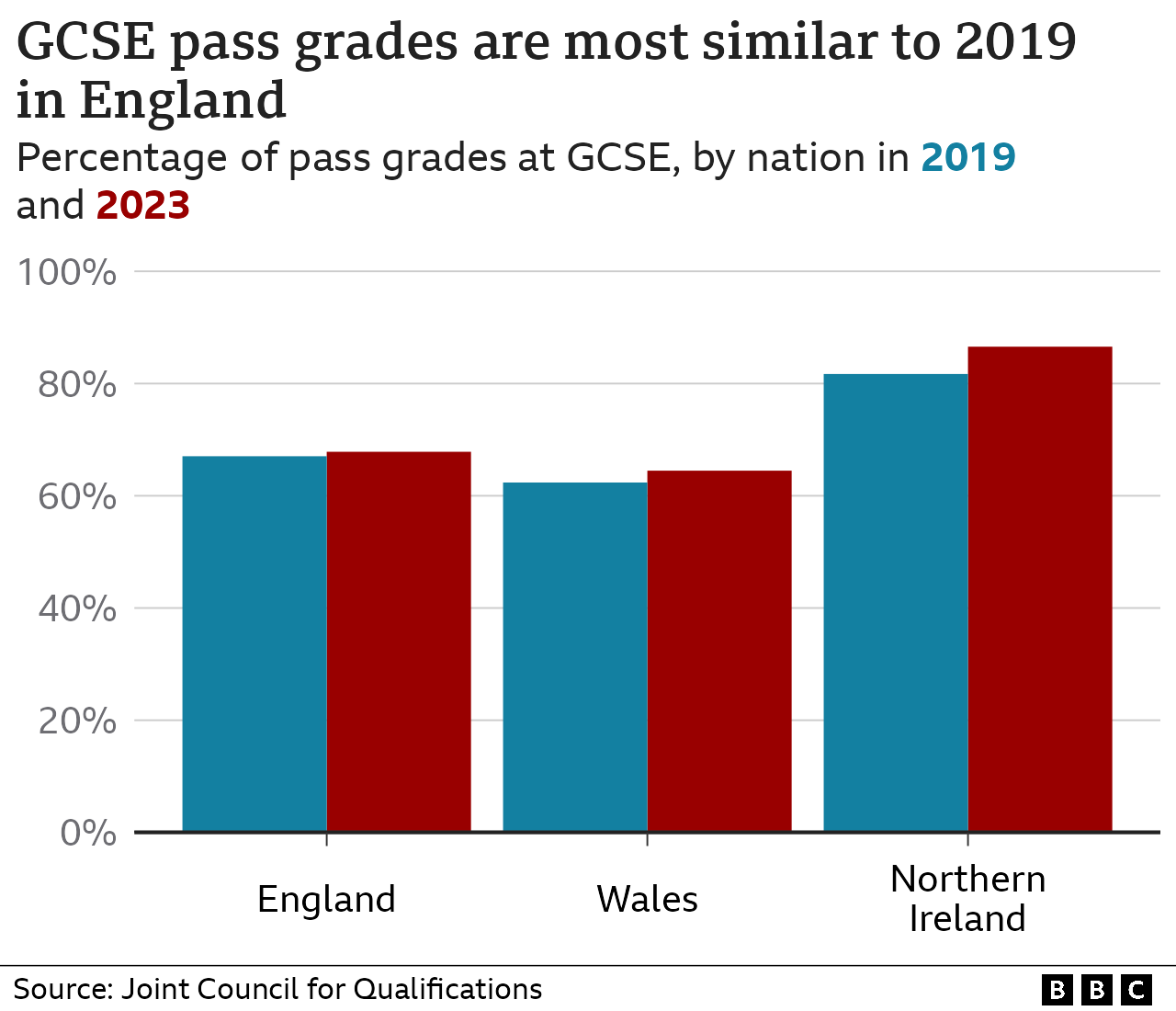
Ofqual says there was "protection built into the grading process" so students should have achieved the grades they would have without the pandemic - even if they performed less well in their exams.
Some Covid measures also remained in place for this year's exams:
Papers in the same subject were spaced further apart than before the pandemic, allowing for rest and revision
Students had formulae and equation sheets in some subjects and were not tested on unfamiliar vocabulary in modern-foreign-language exams
But, unlike in the rest of the UK, students in England received no advance information about the topics on which they would be tested.
Your device may not support this visualisation
3. Tens of thousands more students will have to resit
Tens of thousands more 16-year-olds in England will need to resit their English and maths GCSE exams as a result of this year's grading.
Among 16-year-olds in England, the number of GCSEs marked as a fail (grade 3 or below) has risen by:
more than 38,000 in English language, reaching about 172,000
more than 21,000 in maths, reaching about 167,000
Combined, these numbers are the highest in a decade.
More students sat GCSEs this year but the proportion marked as fails has also risen since 2022 and is now closer to where it was in 2019.
In England, students need maths and English GCSEs at grade 4 or above to move on to further qualifications such as A-levels or T-levels.
Those who failed should be able to start their next courses but will have to resit the GCSEs alongside them.
Julie McCulloch, of the Association of School and College Leaders, said the extra resits would "put more pressure on sixth forms and colleges" and mean "many students are forced into a series of demoralising retakes where the majority will again fall below the benchmark".
Schools Minister Nick Gibb told BBC One's Breakfast programme the policy was "terribly important" but did not say whether more money would be available.
4. Results show a widening regional divide
The pass rate was:
72.6 % in London
63.9% in the West Midlands
The gap between the regions with the highest and lowest proportions of passes was:
6.8 percentage points in 2019
8.7 this year
Commenting on A-level results last week, the Sutton Trust said the difference reflected "patterns of regional prosperity".
Pupils also experienced different amounts of Covid disruption, depending on how their part of the country was affected.
MPs have warned it could take a decade for the gap between disadvantaged pupils and others to narrow to what it was before the pandemic.
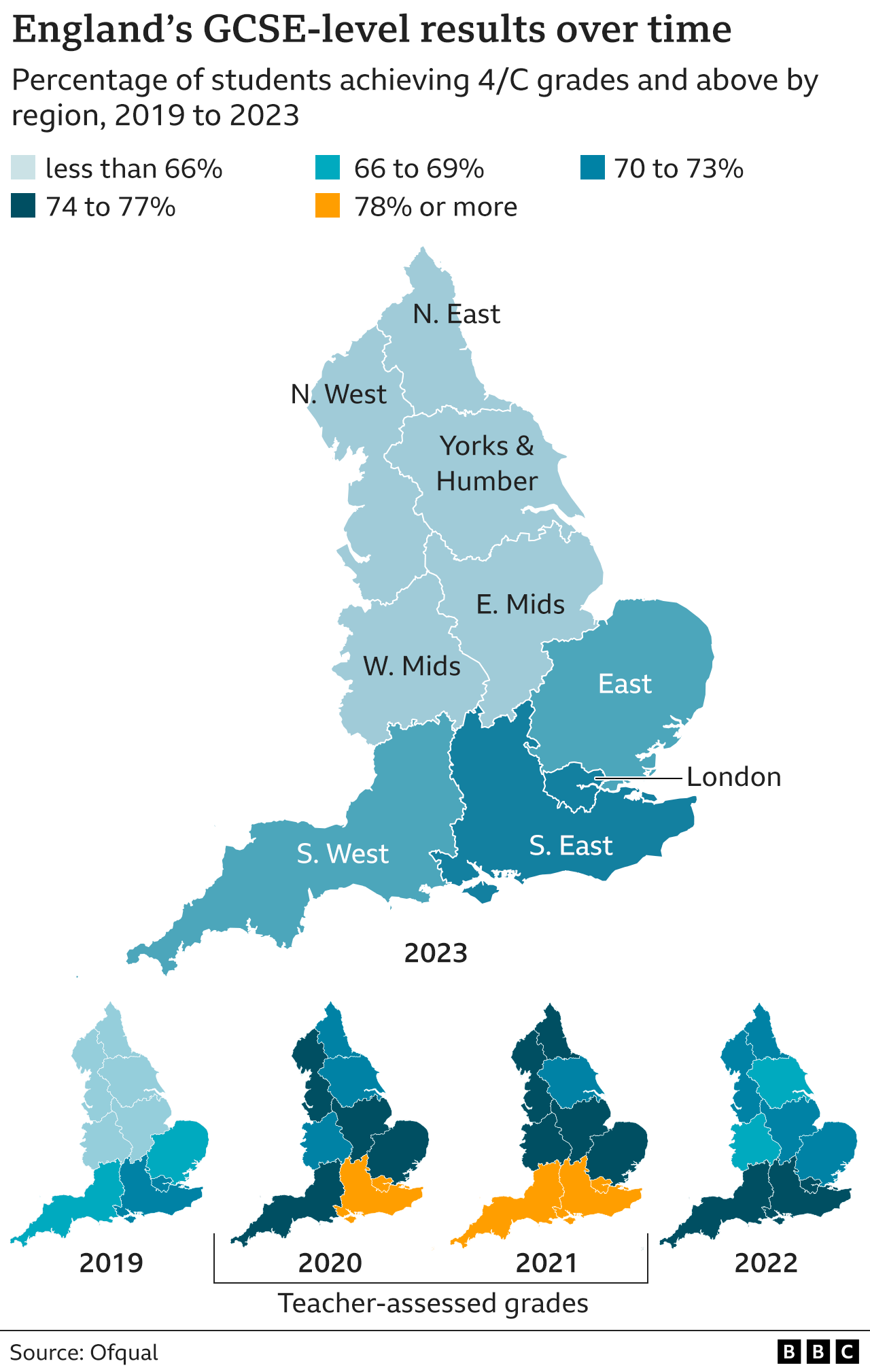
5. The drop in passes is steeper in state schools than private
The pass rate in independent (fee-paying) schools in England was 90.1% this year, down from 92.6% in 2022.
In academies, it was 69.4% down from 74.6%.
Having narrowed in 2020 and 2021, the gap between the two different types of school is more or less back where it was in 2019.
But while the gap in the proportion of top grades grew in 2020 and 2021, it is now slightly smaller than before the pandemic.

Additional reporting: Rob England, Liana Bravo, Libby Rogers, Jana Tauschinski, Maryam Ahmed, and Erwan Rivault.

What questions do you have about results day? Whether you have queries about A-levels, GCSEs, Highers or vocational courses, you can get in touch by emailing haveyoursay@bbc.co.uk, external.
Please include a contact number if you are willing to speak to a BBC journalist. You can also get in touch in the following ways:
WhatsApp: +44 7756 165803
Tweet: @BBC_HaveYourSay, external
Please read our terms & conditions and privacy policy
If you are reading this page and can't see the form you will need to visit the mobile version of the BBC website to submit your question or comment or you can email us at HaveYourSay@bbc.co.uk, external. Please include your name, age and location with any submission.
- Published24 August 2023
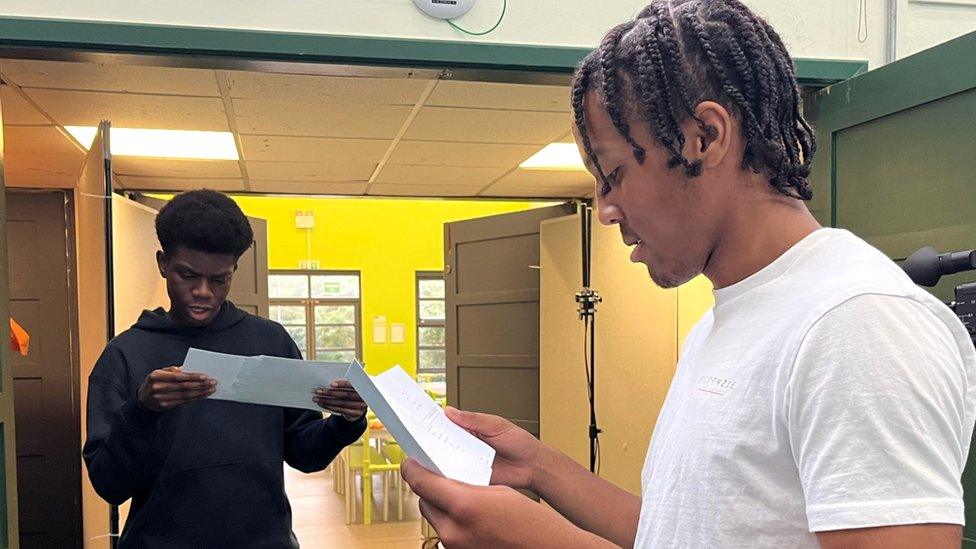
- Published25 August 2022
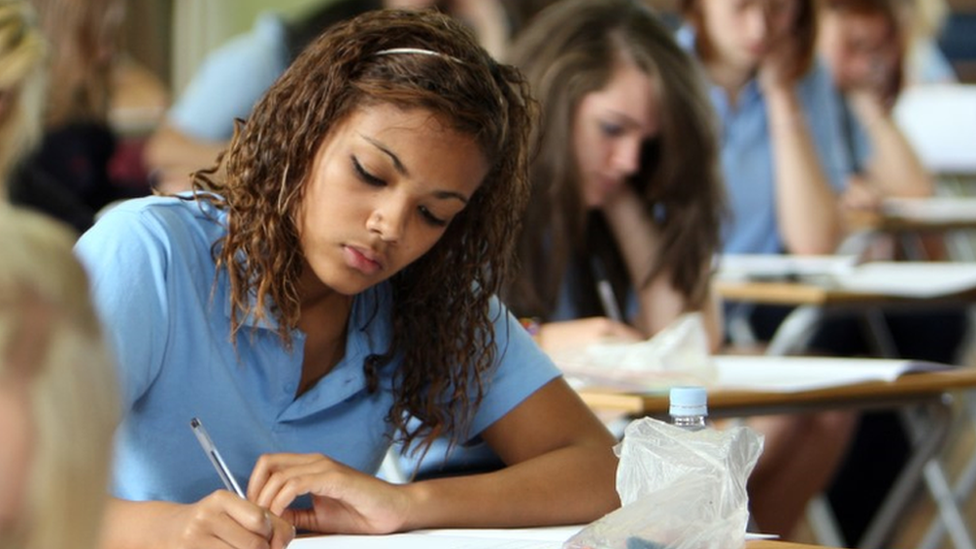
- Published2 days ago

